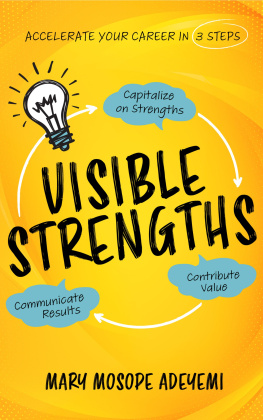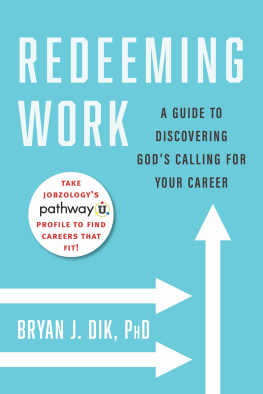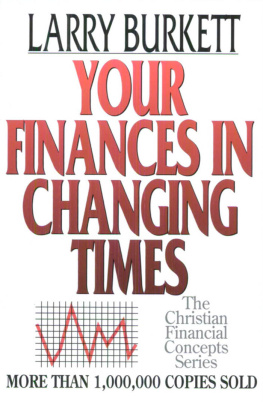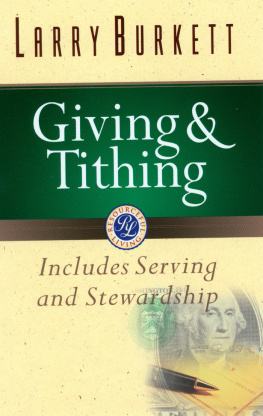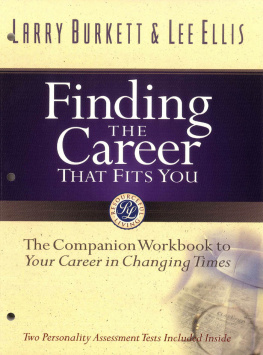
1993 by
LARRY BURKETT AND LEE ELLIS
All rights reserved. No part of this book may be reproduced in any form without permission in writing from the publisher, except in the case of brief quotations embodied in critical articles or reviews.
All Scripture quotations, unless otherwise indicated, are taken from the New American Standard Bible, Copyright 1960, 1962, 1963, 1968, 1971, 1972, 1973, 1975, 1977 by The Lockman Foundation. Used by permission. (www.Lockman.org)
The use of selected references from the Bible in this publication does not necessarily imply publisher endorsement of the version in its entirety.
Editor: Adeline Griffith
Cover Design: The Puckett Group
Interior Design: Ragont Design
ISBN-10: 0-8024-2713-8
ISBN-13: 978-0-8024-2713-7
We hope you enjoy this book from Moody Publishers. Our goal is to provide high-quality, thought-provoking books and products that connect truth to your real needs and challenges. For more information on other books and products written and produced from a biblical perspective, go to www.moodypublishers.com or write to:
Moody Publishers
820 N. LaSalle Boulevard
Chicago, IL 60610
5 7 9 10 8 6
Printed in the United States of America

Contents

D uring the years I was counseling families on their finances, I frequently observed people in career fields that didnt match their talents and abilities. Consequently, they didnt seem to have any joy in their work. Im confident they also were not as proficient as they could have been at something more suited to their natural abilities. Even more important, from a spiritual standpoint, their disdain for their occupation undermined their witness in the workplace.
Studies show that the majority of people are unhappy in their work. Work stress has become a serious problem, and many are burning out from trying to work in areas where they arent naturally talented. This applies to Christians as much as to anyone else.
As I look toward the future of our economy, I see that finding good employment will be a major challenge of the nineties. I believe this book will help to equip you to meet that challenge.

D uring my time on the faculty of the University of Georgia, I was amazed at the high percentage of young people who had no plan for their future, other than just to get a degree and go look for a job. At the core of the problem was an almost total absence of any criteria for career decision making, other than money. Much of my time was spent helping students identify their strengths and weaknesses and choose an appropriate college major.
When Larry offered me the opportunity to come to Christian Financial Concepts, it was probably the easiest career decision anyone ever could have made. I knew the career guidance problem, I knew God had equipped me to work in this particular area, and I was excited about the opportunity to help people be better managers of their God-given talents.
Clearly the world of work is changing rapidly, and career decisions will be more difficult and will have to be made more frequently. For many, the job security once expected has vanished. No one can guarantee employment, but by following the principles in this book, you can know your talents, interests, and, most importantly, develop a Christ-honoring perspective about work.


S hortly after we began the Life Pathways outreach in 1990, it became obvious that people needed more information on how to make career decisions from a biblical perspective. About that same time, Greg Thornton and Bill Thrasher from Moody Press began to talk to us about the need for a book covering the principles we were using in our program. They had vision for this book, they were persistent, and their encouragement has been especially meaningful.
Adeline Griffith, our editor, deserves special recognition for her diligence and professional contribution to this project. Her efficiency is remarkable and enables incredibly fast turnarounds on edits and re-edits. Adeline is a great asset to the CFC team and we really appreciate her.
The Life Pathways staff has done a remarkable job in developing and carrying out the assessment program. Their dedication to the mission of helping others has been crucial to our success.
The entire Christian Financial Concepts staff plays a direct role in supporting the activities of Life Pathways. Every department supports Career Pathways in some way, and it really has been a team effort.
We especially appreciate the many clients and Money Matters newsletter readers who have allowed us to reprint their letters and testimonies. As you will see, their stories are an important element of this book.
We also owe special thanks to our wives Judy Burkett and Mary Ellis and our families who have supported us so faithfully during our own career journeys.
Finally, we say thank you to all those who have participated in the Life Pathways assessment. Without you, this book would not have been possible.
It is our prayer that this book will help us all to better understand that Jesus Christ is the true Shepherd who stands ready to guide us on a career pathway that will bring honor and glory to Him.


T he twentieth century has been an era of unbelievable changes. We literally have gone from the horse and buggy days to outer space in less than 100 years. At the turn of the twentieth century, 90 percent of Americans worked in agricultureusually on small farms. Now less than 5 percent earn a living growing our food.
We have seen the evolution of mass production technology, such as the automobile assembly lines, shifted from people to machines and the office work force capability expanded a thousandfold by computers.
New technologies have accelerated changes in transportation, manufacturing, communications, and nearly every other area of our lives. But all changes bring with them some pluses and some minuses. Certainly our technology revolution is no exception.
For instance, at the turn of this century a high school dropout could expect to get a good job. Why? Because the technology of the time required little formal education. By mid-century, a high school diploma was a minimum requirement for most production jobs; and by the beginning of the next century, at least some post-high-school education will be needed for virtually any job.
Next page



